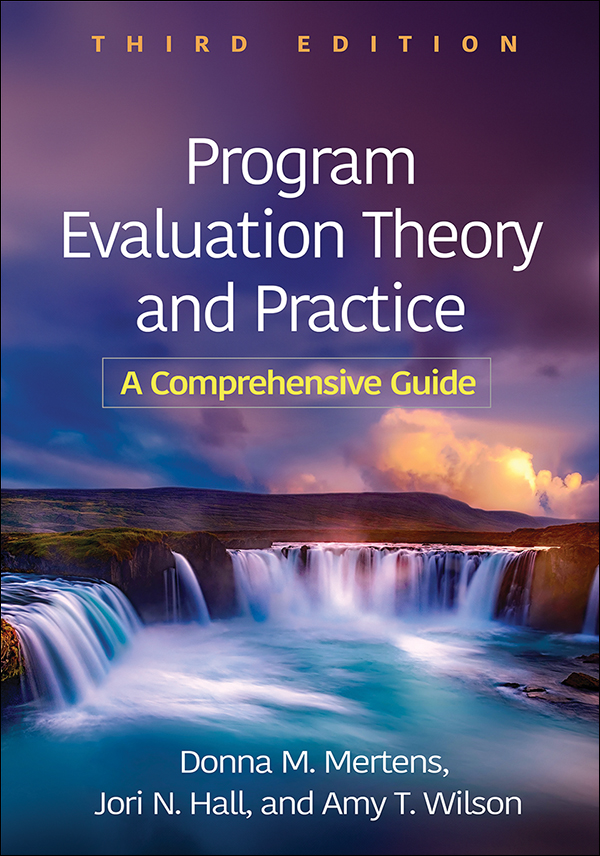Program Evaluation Theory and Practice
Third Edition
A Comprehensive Guide
Donna M. Mertens, Jori N. Hall, and Amy T. Wilson
HardcoverPaperbacke-bookprint + e-book
Hardcover
orderFebruary 14, 2025
ISBN 9781462555918
Price: $134.00 631 Pages
Size: 7" x 10"
Paperback
orderJanuary 17, 2025
ISBN 9781462555901
Price: $89.00631 Pages
Size: 7" x 10"
“I will continue using Program Evaluation Theory and Practice as my go-to text for all my foundational and advanced evaluation courses. Mertens, Hall, and Wilson seamlessly integrate evaluation theory and practice in a comprehensive and accessible format. The inclusion of the transformative paradigm and social justice branch has always made this a standout text. The introduction of the Indigenous paradigm in the third edition is laudable. This book is essential for new, intermediate, and seasoned evaluators.”

—Ayesha S. Boyce, PhD, Division of Educational Leadership and Innovation, Mary Lou Fulton Teachers College, Arizona State University
“This text does a great job of providing a wide overview of program evaluation and an initial knowledge base about the most relevant topics in theory and practice. Readers who take a deep dive into this text will be ready to venture into the field under the guidance of a senior evaluator.”

—Dorothy Skierkowski-Foster, PhD, Department of Psychology, University of Rhode Island
“The pedagogical features support student learning. The 'Preparing to Read' and 'Moving On' elements that bookend each chapter help to guide students through the material. My students are especially interested in the numerous and varied evaluation examples, including examples from international programs. I have not found another program evaluation text that offers this quality and diversity of international examples.”

—Adriana Cimetta, PhD, MPH, Director, Center for Educational Assessment, Research, and Evaluation, University of Arizona College of Education
“I chose this book because of the strong, detailed chapters on paradigms and theories. The text truly helps students identify their theoretical frames for their pending research. The examples are critically important in bringing the theories and methods to life.”

—Juan C. Gonzales, PhD, Department of Educational Leadership and Policy, The University of Texas at Austin
“The strengths of this text include its readability and pedagogical features. The presentation of concepts and practices is just as comprehensive as in other evaluation texts, but the pedagogical features highlight the main concepts and move the reader along. Case study applications provide sufficient detail for integration into course activities and assignments. The book is well balanced in laying a theoretical foundation and guiding the user through the evaluation cycle with diverse applications. Students will continue to reference the resources in this text when they become practicing evaluators.”

—Kristin Koskey, PhD, Research Professor and Co-Director, The Methods Lab, Drexel University School of Education
“This book offers a theoretically grounded introduction to program evaluation, along with practical examples. It provides insightful guidance to help prepare the reader for professional practice.”

—Christopher Gareis, EdD, William & Mary School of Education
—Ayesha S. Boyce, PhD, Division of Educational Leadership and Innovation, Mary Lou Fulton Teachers College, Arizona State University
“This text does a great job of providing a wide overview of program evaluation and an initial knowledge base about the most relevant topics in theory and practice. Readers who take a deep dive into this text will be ready to venture into the field under the guidance of a senior evaluator.”
—Dorothy Skierkowski-Foster, PhD, Department of Psychology, University of Rhode Island
“The pedagogical features support student learning. The 'Preparing to Read' and 'Moving On' elements that bookend each chapter help to guide students through the material. My students are especially interested in the numerous and varied evaluation examples, including examples from international programs. I have not found another program evaluation text that offers this quality and diversity of international examples.”
—Adriana Cimetta, PhD, MPH, Director, Center for Educational Assessment, Research, and Evaluation, University of Arizona College of Education
“I chose this book because of the strong, detailed chapters on paradigms and theories. The text truly helps students identify their theoretical frames for their pending research. The examples are critically important in bringing the theories and methods to life.”
—Juan C. Gonzales, PhD, Department of Educational Leadership and Policy, The University of Texas at Austin
“The strengths of this text include its readability and pedagogical features. The presentation of concepts and practices is just as comprehensive as in other evaluation texts, but the pedagogical features highlight the main concepts and move the reader along. Case study applications provide sufficient detail for integration into course activities and assignments. The book is well balanced in laying a theoretical foundation and guiding the user through the evaluation cycle with diverse applications. Students will continue to reference the resources in this text when they become practicing evaluators.”
—Kristin Koskey, PhD, Research Professor and Co-Director, The Methods Lab, Drexel University School of Education
“This book offers a theoretically grounded introduction to program evaluation, along with practical examples. It provides insightful guidance to help prepare the reader for professional practice.”
—Christopher Gareis, EdD, William & Mary School of Education



